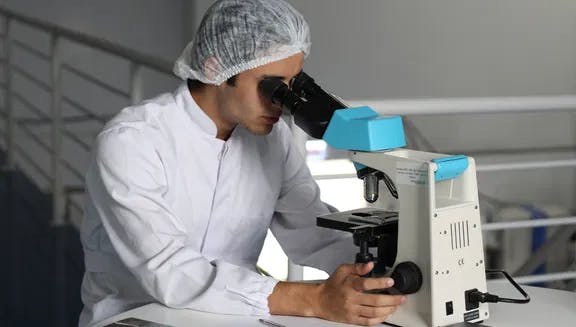
UvA developing AI-powered innovations in sustainable materials
Using AI to address the challenges of a sustainable future
In the last decade, the AI ecosystem has witnessed significant developments, particularly in the area of generative AI. These advancements, primarily driven by powerful language and image models, have not only transformed industries like content creation and design but also opened up new possibilities in scientific domains.
This progress in AI has significant implications for fields such as biology, physics, and life sciences. In the same way that AI can creatively generate text and images, it can also contribute to innovative developments in scientific research. For instance, in biology, AI can assist in deciphering complex genetic codes, predicting protein structures, and understanding intricate biological processes. The same AI techniques that generate imaginative content can be harnessed to augment research, accelerate discoveries, and contribute to advancements that shape the future of biology, physics, and life sciences.
AI applications in scientific research at the UvA
In a groundbreaking initiative, the University of Amsterdam (UvA) is leveraging Artificial Intelligence (AI) to spearhead the development of sustainable molecules and materials. Bernd Ensing, associate professor of Computational Chemistry at the Faculty of Science, leads the newly established research priority area known as AI4SMM (Artificial Intelligence for Sustainable Molecules and Materials).
The inaugural AI4SMM project’s focus will be on critical areas such as salts for energy storage, making steel more sustainable, safe additives for plastics, and plant proteins for innovative foods. With the goal to revolutionise the material transition essential for a sustainable society by working to use machine learning to find patterns in data streams from experiments across various scientific fields.
The Faculty of Science at UvA, renowned for its expertise in AI and Machine Learning, is positioned as a global leader in applying AI to address the challenges of a sustainable future. Ensing emphasises the project’s multidisciplinary approach, with sustainability embedded in the research across various institutes, including chemistry, biology, physics, and life sciences.
Materials and substances designed to be inherently safe for both humans and the environment are crucial for achieving this vision for society. According to Ensing, realising the necessary transition in materials for sustainability is the key goal.
AI, as an indispensable tool, utilises machine learning and computational methods to forecast the connection between the structure and properties of molecules and materials. This application of AI holds the potential to enhance sustainability across various domains, including food and agriculture, construction materials, green industrial processes, energy transition, consumer goods, and healthcare.
Molecules and AI
Two innovative approaches are at the forefront of the AI4SMM research.
- Graph neural networks found in many machine learning applications - use molecules as spatial networks, allowing AI to comprehend molecular properties via network analysis, developed by IvI professor Max Welling
- A method influenced by natural language processing - similar to models like ChatGPT, views molecules as words, except it uses chemical grammar to establish connections and predict interactions.
As AI develops rapidly, Ensing is optimistic about the momentum around AI4SMM. The intention is not just to stay within Amsterdam but to envision a Dutch consortium contributing to a sustainable future through AI-driven materials and molecules aligning with the city's collaborative spirit. The AI4SMM program complements existing initiatives like AI4Science and AMLab at the UvA, creating a vibrant ecosystem in Amsterdam for AI applications in scientific research.
Related articles

Scientists reveal new ‘atlas’ to map embryonic brain DNA for mental health

Global healthcare leaders embrace generative AI to close ‘critical gap’ says Philips report

Dutch government allocates €148M to boost green technology

€22M investment to help develop new therapies for blindness

Watermeln secures over €3.5M to lead hydrogen generator market

Dutch offshore wind project OranjeWind secures major turbine order

AiSalon launches in Amsterdam cultivating collaboration in AI innovation

Official collaboration strengthens the future of AI in Amsterdam

Surge in megarounds signals strength in European tech sector

